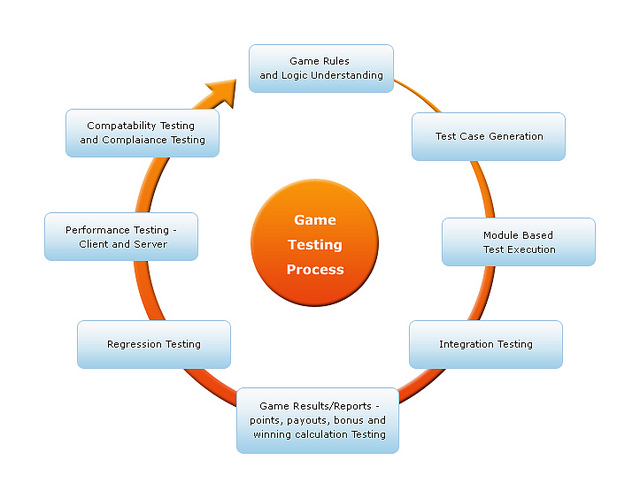Game Testing: Play Pause Test

Wiki: Game testing, a subset of game development, is a software testing process for quality control of video games. The primary function of game testing is the discovery and documentation of software defects (aka ![]() bugs). Interactive entertainment software testing is a highly technical field requiring computing expertise, analytic competence, critical evaluation skills and endurance.
bugs). Interactive entertainment software testing is a highly technical field requiring computing expertise, analytic competence, critical evaluation skills and endurance.
Game Tester! Is that a real-job? I get this question a lot. Let’s get into some Myths, Facts and some examples to know what a Game Testers life really is.
Game or Software Testing? Really!
Games are softwares. Like any other software a lot of code goes into the Game depending on the size, playtime and platforms. They own all the standard procedures of development. Plus, a lot of creativity, art, logic, money & fun.
Game Testing Myths: It’s not half as easy as you think.
- Game testers do not get to simply play the newest video games and then tell the company or developers what they think. It is actually the game developers who decide what a good game consists of, and then hires testers to find the glitches and bugs in the game.
- Game testers do not get to work 10-20 hours a week and pull in over one-hundred grand a year. This simply does not happen. In fact, right before games are released, you will find yourself burning 70-80 hours a week to complete all the tests you are assigned.
- Game testers do not get to just hang out at home and work whenever they want to. The concept behind being a game tester is to work as a team, and you cannot do that if you are not sitting there with other testers and the developers.
- Game testers are not just lazy, high school drop outs who only want to play video or computer games. Actually, game testers have to have a lot of education in gaming, graphics, and other areas plus experience to even land in a good paying game testing job.
The Bigger Brain: Skills to be a Game Testing Pro
- Programming – You need to understand and analyse a lot of code. Games are nothing but chunks of code at the back.
- Critical Thinking – Using logic and reasoning to identify the strengths and weaknesses of alternative solutions, conclusions or approaches to problems. It’s all logic & reasoning ruling games.
- Complex Problem Solving – Identifying complex problems and reviewing related information to develop and evaluate options and implement solutions. You may have to traverse many paths to end up and finally save the Princess
- Systems Analysis – Determining how a system should work and how changes in conditions, operations and the environment will affect outcomes. Games are softwares that are highly responsive to varying system conditions.
- Computers and Electronics – Knowledge of circuit boards, processors, chips, electronic equipment and computer hardware and software, including applications and programming. Yes, when it comes to games you are dealing with PCs, laptops, Consoles, Mobiles and what not.
- Attention to Detail – Requires being careful about detail and thorough in completing work tasks.
- Independence – Requires developing one’s own ways of doing things, guiding oneself with little or no supervision and depending on oneself to get things done. You own your game.
- Creativity – There should be an Artist in every tester. You need to understand the art & innovation that has gone in. Games are nothing but creativity in ‘1’s and ‘0’s.
- Love for Games – This is just obvious and the first point. You need to love what you do to be successful.
Game Testing Methodologies:
Like any other software all the common testing methodologies apply to games as well. What’s more…?
- Play Testing: Play testing describes playing the game for non-functional features like balance, difficulty and most importantly for “fun factor”. Unlike other game testing techniques, play testing answers a very important question: “Does the Game work well”. Play testing is more about judgment than facts.
- Compliance testing: It’s the reason for the existence of game testing labs. First-party licensors for console platforms have strict technical requirements titles licensed for their platforms. Most notably the formatting of standard error messages, handling of memory card data, and handling of legally trademarked and copyrighted material, are the responsibility of the game testers. Even a single violation in submission for license approval may have the game rejected, possibly incurring additional costs in further testing and resubmission. In addition, the delay may cause the title to miss an important launch
 window, potentially costing the publisher even larger sums of money.
window, potentially costing the publisher even larger sums of money. - Soak testing: This involves leaving the game running for prolonged period’s time in various modes of operation, such as idling, paused, or at the title screen. This testing requires no user interaction beyond initial setup, and is usually managed by lead testers. Automated tools may be used for simulating repetitive actions, such as mouse clicks. Soaking can detect memory leaks or rounding errors that manifest only over time. Soak tests are usually one of the compliance requirements.
- Multiplayer testing: This will involve separate multiplayer QA team if the game has significant multiplayer portions. This testing is more common with PC games. The testers ensure that all connectivity methods (modem, LAN, Internet) are working. This allows single player and multiplayer testing to occur in parallel.
The Multitasker in You: If you are through the points below, you are good to be a Game Tester.
There has to be a multitasker in you to be a good Game Tester.
- You should be Creative, Agile, Pro-active & Technical. The new-gen games are the most complex softwares you will meet head-on. They have complex codes, logics & arithmetic.
- Stay updated on the latest Hardware and Software updates related to Games. Flash, iframes, DirectX, Drivers, PSUs, GPUs, Consoles, Mobiles, Tablets, Phablets, DTHs and all Interactive entertainment devices & softwares you can get your hands on.
- The better you are with Time Management the better you will prosper with your games and testing. You are going to test larger portions of the Game the closer you get to the delivery window. Yes! You are going to burn your days and nights close to releases.
- You should be top on your communication. It’s not just your boss, you are going to be around Developers, Designers, Artists, Animators, Content writers, Producers, PMs, CS (Customer Support) Guys…take a break!
- You should be logical and good with problem solving – you get stuck on a functionality or feature in a game, you standout if you have the work around. Ideas & Innovations are always appreciated in Gaming firms.
- You should be well equipped with some good software tools that could capture media & sound, debug, annotate and compress them- You are going to need a lot of Gameplay recordings and Playbacks. Most of these days general game flows are automated – be smart with a good automation tool & scripts as well.
- Own the accurate eye and ear – Play through the game, grab the character details, the world detail, textures, shadows, collisions, cosmetics, subtitles, gameplay sounds, music, HUDs, other locked and unlocked features, level ups ,bonuses….. And the irony – most of them come together per frame in the latest console and PC games. If two eyes are all you’ve got, make sure they are sharp as any blade and the ears as good as a Bat’s.
Game Developing teams on average, spends more time on testing than any other application development team. Game testing sometimes become more complex, because of the diverse development of different components of the game. Testing plays an important role in every development step of the game. It’s not just any Man’s game. You should be a natural Gamer and a specific set of skills are what can fit you into a Game Tester’s soles.
Happy Gaming!